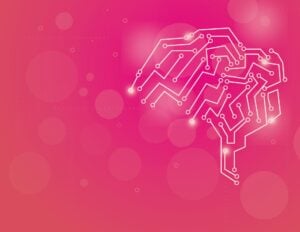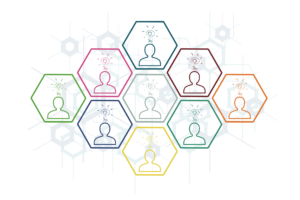Augmenting Insights
The strong combination of AI and anthropological studies could indeed propel research methodologies forward. In fact, AI perhaps more than any other technological advancement could potentially navigate the complexity of human and societal behaviors.
In “Ten Predictions for AI and the Future of Anthropology,” from Anthropology News, Matt Artz makes the case that AI will be transformative to the field. Artz is an anthropologist specializing in user experience, product development and consumer insights. He is the founder of Azimuth Labs, and the creator and host of the Anthropology in Business and Anthro to UX podcasts.
“The future of anthropology is AI. We should embrace it and help shape its development, or risk being left behind,” says Artz. His predictions include:
1. All five fields will be disrupted: AI will profoundly impact all branches of anthropology, including applied anthropology. Its integration with archaeology will enable enhanced artifact analysis, reconstruction of ancient environments, and the identification of undiscovered sites. Biological anthropology will benefit from accelerated complex genetic data analysis and reconstructions of early humans. Meanwhile, linguistic anthropology will realize new opportunities for studying, reclaiming, and teaching endangered languages. It will also help cultural and applied anthropologists reveal hidden cultural patterns and spot emerging trends, leading to a better understanding of our past and more attuned interventions in the future.
2. AI as a collaborative partner: AI will soon be foundational to our work practice. We will engage AIs in discussions and creative brainstorming, leveraging their unique strengths to complement and scale our abilities. With the help of AI, anthropologists will be able to gain broader perspectives, leading to richer insights and increased problem-solving abilities.
3. Transforming ethnography: AI is poised to revolutionize ethnography by fundamentally altering how researchers conduct their work. AI-assisted ethnography will support researchers in collecting, analyzing, and interpreting data at scale. Techniques such as web scraping, natural language processing (NLP), and computer vision will make this possible and unveil new insights and patterns.
4. Enhancing public engagement: AI-generated visualizations, videos, interactive data representations, and immersive digital experiences will help anthropologists to convey complex research findings and narratives in appealing, relatable, and accessible ways to wider audiences.
5. Automated digital ethnography (ADE): ADE enhances traditional ethnographic methods by automating the research process within digital field sites. By deploying programmed ADE agents, researchers can tap into the vast amounts of unstructured data available on the Internet, such as social media posts, forum discussions, and blog entries. As these agents continuously collect and analyze data in real time, they act as ever-present partners in the field, providing researchers with valuable and up-to-date insights. This real-time engagement will assist anthropologists in quickly identifying emergent human behavior and cultural patterns, leading to more agile and timely research.
6. AI multimodal analysis: Integrating AI into ethnographic research will revolutionize the scale at which anthropologists conduct multimodal analysis. Handling multimodal data can be extremely time consuming, often requiring researchers to meticulously sort through and piece together various forms of information. But with AI we can automate the process of sifting through and analyzing diverse data types, such as text, images, audio, and video, significantly reducing the time and effort required. This efficiency will allow anthropologists to focus on more complex and nuanced aspects of the research process.
7. Anthropology-specific AI: With the increasing integration of AI into anthropology, we can expect to see specialized tools designed to address the unique challenges and complexities inherent in studying the human experience, going beyond the capabilities of general AI models. One example may be a fine-tuned large language model (LLM) that extends general knowledge LLMs such as OpenAI’s GPT-4. With these anthro-specific tools, anthropologists will benefit from more contextually relevant insights.
8. Advancing research with knowledge graphs: Anthropological knowledge graphs (AKGs) will revolutionize how anthropologists store and access information by creating specialized knowledge repositories that interlink entities—people, organizations, concepts, historical events, methods, disciplines, publications, and more—within a contextual framework. As these AKGs develop, they will empower researchers to better comprehend human social, cultural, biological, and linguistic diversity, paving the way for a web-scale model that accurately represents the complexity of human experience.
9. New models of anthropological entrepreneurship: Historically, anthropological entrepreneurs typically set up research practices. While that is not going to change, and it may even be accelerated by the incorporation of AI, the new model of anthropological entrepreneurship will take the form of founding tech companies that combine the wisdom, empathy, and ethics of anthropology with computer and data science to innovative businesses models and products. By bringing an anthropological perspective to the technology industry, these entrepreneurs can ensure that AI applications are developed with a deep understanding of the complexities of human societies and the potential consequences of technology. This will create products and services that prioritize ethical considerations, minimize adverse impacts, and contribute positively to global communities.
10. Productize anthropology: Artz’s vision for the future of anthropological entrepreneurship includes an AaaS platform. Imagine a subscription-based service that is accessible to anyone, regardless of their background. This platform would harness anthropology-specific AI tools for data collection, analysis, and insights generation, democratizing anthropological knowledge and promoting innovation. By making anthropological insights widely accessible, an anthropology as a service (AaaS) platform could help to propel the discipline forward, ensuring its ongoing relevance and impact in our increasingly digitized world.
Research Agility
In “Infusing the Behavioral Insights Mindset,” All Things Insights’ Seth Adler explored “Activating Behavioral Insights: Team & Consumer Themes” with Jennifer Avery, Senior Vice President, Strategy & Insights, Universal Parks & Resorts, and Cherie Leonard, Senior Director, Head of North America Insights, Colgate-Palmolive, NA. They discussed the implementation of a behavioral insights initiative from both a team and consumer perspective, team temperament, and leveraging consumer behavioral science in the research and outcomes.
Looking forward to FEI 2024? The conference, which will be held June 10 to 12, will feature the presentation, “Agile Insights Unleashed: AI and Anthropology Transform Buzz into Reality,” presented by Ujwal Arkalgud, EVP and Group Director for Consumer Innovation, Lux Research. This session explores the pivotal role of the synergy between Artificial Intelligence (AI) and in-depth anthropological research in actualizing genuine agile research. This unique combination not only propels research methodologies forward but also deeply understands and navigates the complexities of human behavior and societal trends. The session will demonstrate the transformative impact of AI and anthropological insights working in tandem to redefine research agility. Register for FEI 2024 here.
The Convergence of Tools & Research
By delving into how AI-enabled tools and anthropological research converge, Lux Research says it aims to initiate a new wave of innovation and insights within the research community. This could well serve as a renewed vision for achieving agile research, focusing on the strategic use of AI and anthropology to foster an approach that is both more adaptive and deeply human-centric.
Of course, ethical considerations must also be top of mind when it comes to developing AI tools for various fields of study, including agile research.
Artz notes, “As we embrace the exciting possibilities that digital innovation brings to anthropology, we must remain vigilant and committed to addressing the ethical challenges that come along with it. By critically examining issues such as bias, fairness, transparency, privacy, and the potential impact on job markets, we can work towards a future where AI is a force for good within our discipline. We are uniquely positioned to contribute to these conversations and ensure that anthropological insights inform the evolution of AI technologies.”
Video courtesy of Matt Artz
Contributor
-

Matthew Kramer is the Digital Editor for All Things Insights & All Things Innovation. He has over 20 years of experience working in publishing and media companies, on a variety of business-to-business publications, websites and trade shows.
View all posts










































































































































































































